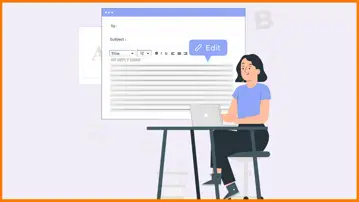Unlocking Job Offer Letters: Candidate's Guide
When you're in the process of being hired for a job, the offer letter plays a vital role, as you must accept and sign it before commencing your employment. The offer letter provides comprehensive information about your employment before it takes formal effect. In this article, Aniday gives you an overview about what is an offer letter and what to expect when you receive one.

What is an offer letter?
An offer letter is a formal document outlining the terms of employment for a new hire. It encompasses crucial details such as salary, benefits, and other pertinent information that aids in your decision-making process regarding the job acceptance.
In addition, it typically includes clauses outlining at-will employment, any conditions or contingencies related to the offer, and a confidentiality agreement. It's important to note that accepting and signing an offer letter does not legally obligate the candidate to join the company, although exceptional circumstances may, in rare instances, result in such an obligation.
What isare included in an offer letter?

Here are various elements that you might encounter in your offer letter:
-
Job Title: The offer letter may specify your official job title and, where relevant, the department in which you'll be working.
-
Job Description: Some offer letters provide a detailed job description, outlining your responsibilities and tasks. If this information is not included, you can request a copy, as many companies maintain job descriptions on file.
-
Compensation: Compensation: The offer letter may outline your salary, inclusive of bonuses or commissions. It may also specify if the role is full-time, part-time, temporary, or a contract position, and your exempt or non-exempt status, which impacts overtime eligibility.
-
Work Schedule: Employers may outline your expected work hours per week, potentially including weekends, evenings, or holidays if the role demands it. The offer letter typically specifies your anticipated start date, which is often agreed upon during the interview process.
-
Time Off: The offer letter can specify the particulars of your paid time off (PTO). This information confirms the number of paid vacation days, sick leave, or volunteer hours you accrue annually and when you become eligible for these benefits, usually after a probationary period of 60 or 90 days.
-
Benefits Package: Many full-time positions offer a benefits package. Your offer letter may contain information about the available benefits, such as healthcare and retirement plans.
-
Reporting Structure: Your employment offer letter might outline the reporting structure within the organization. Some companies assign a peer mentor to help you when you're initially settling into your new role. This mentor is a resource for questions and assistance.
-
Termination Conditions: Lastly, the offer letter may include details about termination conditions. This is a crucial element to have in writing in case of any future disputes. It outlines the terms under which your employment may be terminated.
What should you do when you receive an offer letter?
Here's a guide on how to handle a job offer letter once you've received it. The company expects you to either accept or decline the offer. Here are the steps to respond to a job offer letter:
Acknowledge the Offer
Promptly acknowledge the offer, expressing gratitude and confirming receipt. Be mindful of response deadlines; request an extension if considering multiple offers.
Evaluate the Offer
Take time to assess the offer, weighing factors like the role, compensation, benefits, and alignment with your values or the company's mission. If you're confident about the fit, consider accepting it. If you have doubts, reach out to the recruiter or employer for clarification.

Consider Negotiating
Review the offer's terms, including salary, benefits, and PTO. If they don't align with your expectations, contemplate negotiating. Rather than declining or accepting outright, submit a counteroffer.
Accept or Reject
If you opt not to negotiate, your choices are to accept or decline the offer. Respond formally in writing to inform the employer or recruiter of your decision. When declining, you can state your reasons, but it's not obligatory.

Compose Your Reply
If declining, thank the recruiter or employer for the offer and optionally provide your reasons for declining. Sign off with kind regards and your name. If accepting, address the supervisor or company by name, express gratitude for the offer, confirm employment terms, specify your start date, convey your excitement, and provide your contact information.

Sample Job Offer Letter
Here is a job offer letter example for your review:
Dear ABC,
At XYZ, we've enjoyed our interactions with you during the interview process. Your background and personality align perfectly with the role of Digital Marketing Supervisor that we have in mind. This is a full-time position, with hours from 9 a.m. to 5 p.m., and the option for remote work once you're settled. You'll also receive 14 paid vacation days annually after three months with us.
In this role, you'll report to Alice Smith, our Director of Marketing, and oversee a small team that includes interns. Your main responsibility will be crafting and implementing a digital marketing strategy within our broader marketing framework. You'll delegate tasks and ensure your team meets their goals while continuously optimizing performance.
As previously discussed, we're offering an annual base salary of $85,000 with a yearly bonus tied to company performance. Our comprehensive benefits package covers health, dental. Your expected start date is May 1, 2023, and we kindly request your response by April 1, 2023. If you have any questions or concerns before then, please don't hesitate to reach out. We're thrilled about the prospect of you joining our team and look forward to your response.
Sincerely,
CEO
XYZ
Conclusion
Receiving an offer letter signifies that your skills and experience are highly regarded by the company, leading to a potential job opportunity. Understanding what is an offer letter and how to respond can boost your confidence during your job search. Aniday aims to provide you with an informative overview to better equip you for your job search journey.
Aniday's HR Services
Headhunting Service
Find and recruit quality candidates in just 1 week! Supported by 40,000 experienced headhunters in IT, Finance, Marketing… capable of recruiting in any region.
Headhunting Service ➔Employer of Record (EOR) Service
On behalf of your business, we recruit employees and handle payroll without the need to establish a company in markets such as Vietnam, Singapore, Malaysia, India, Indonesia…
Employer of Record (EOR) Service ➔